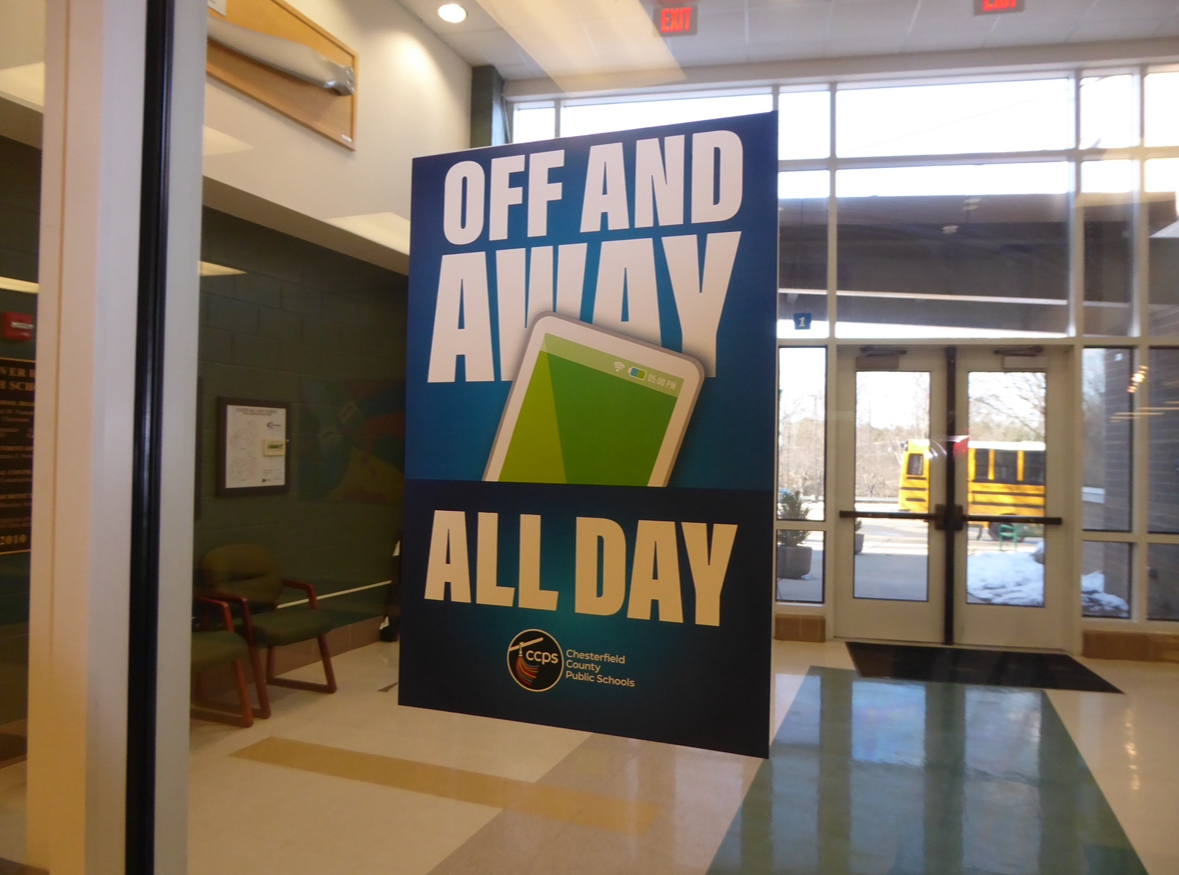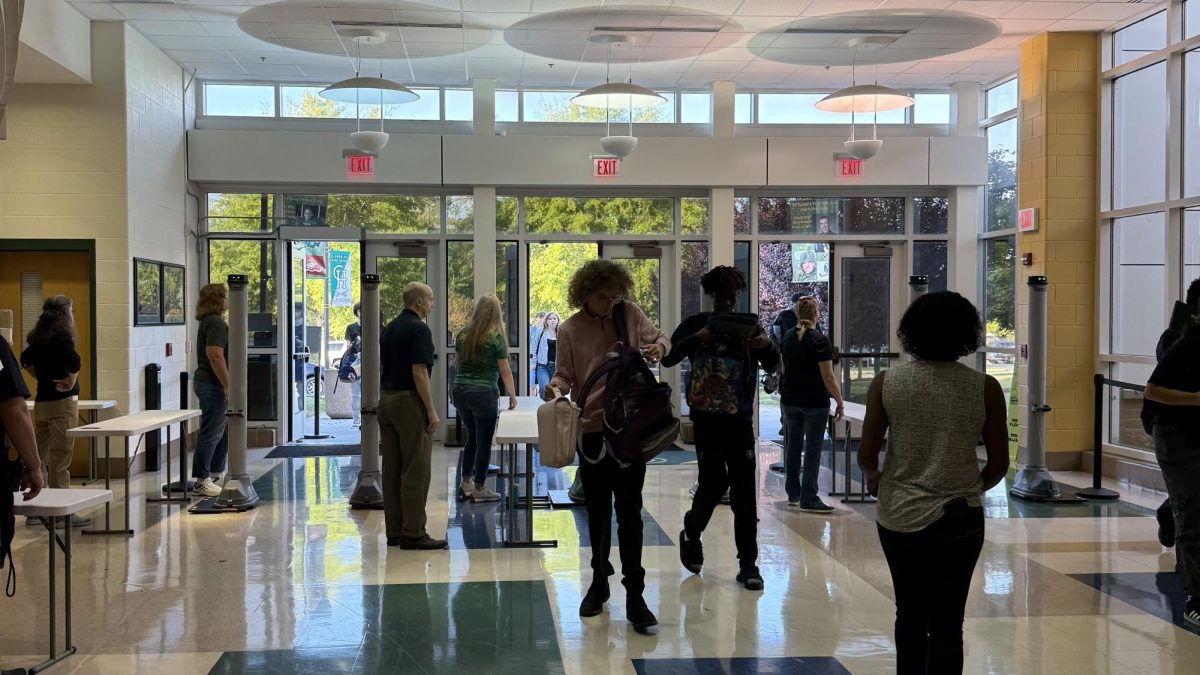Following the extended winter break, the county-wide electronic ban was carried out on Jan 9.
The Chesterfield County School Board approved the ban on Dec. 10 at their monthly meeting. The focus of the ban is to improve students focus, lessen classroom distractions, and strengthen social interactions.
Junior Nia Evans, shares her insights on the process of the banning.
“I think it will be challenging and a big problem but after a while it will die down,” said Evans.
As of Jan. 9, all phones are to be powered off and kept inside a student’s backpack from the first bell to the last bell. This includes all devices that connect to Wi-Fi or bluetooth.
According to the Chesterfield County Public Schools website, “Students will not be able to use a cellphone or have a cellphone in sight at any time during the instructional day. This includes lunch, times between classes, when students are in hallways, etc.”
The process of a phone being taken begins with putting it in a paper bag and sending the students phone and information to administration. The confiscated phones are then returned during the fourth period until Jan. 22. After Jan. 22, a confiscated phone will need to be picked up by a parent or guardian during school hours.

This transition has not been easy for fellow students that have become accustomed to always having access to their devices. Harlyieh Corbitt, a freshman at Clover Hill, shared the biggest struggle she is dealing with following the ban.
“Keeping it in my bookbag all day is the hardest part because it’s usually in my pocket or on me at all times,” said Corbitt.
As students adapt, teachers have expressed their hopes for their students to become more engaged as a result of the ban.
“I think it would be great if students were less distracted and could focus more on their school work,” said a teacher at Clover Hill.
With the first official day of the ban, a total of around 40 phones or other Wi-Fi connected devices were confiscated. This total is significantly lower than the original estimate that would be taken. With this, many students and staff members have expressed their concerns about the collected phone total increasing once the students stop seeing the phone ban as a change of pace and less serious as the months go on.
“I think people are going to end up getting sick of it and go against it at some point,” said Corbitt.
Only time will tell whether this shift will be a lasting change, or if the challenges of maintaining it will lead to a return to old habits.









Satiyana • Sep 12, 2025 at 2:55 pm
This article is written so well, I like how you included how students felt about this topic. I feel like the phone ban is good, but, in some ways I feel it is unnecessary. To me the phone ban is good because it keeps some students from not procastinating. I understand why we shouldn’t be able to have phones in class and that for most students phones can be a distraction, but, I dont understand why we can’t have phones while we are eating lunch. I feel that students should be able to have phones out during lunch because we are outside of class and we are just talking to our friends. Overall I feel like the phone ban policy is good, I don’t agree with all of the rules to the policy but I understand why the county did it.
Rea • Sep 12, 2025 at 2:13 pm
I believe that the phone ban is a bad idea. For example, if there’s an emergency and you can’t go to the office for some apparent reason to contact your parents, what are you going to do then? you can’t have your phone to contact them. I liked when I could be on my phone when I was done with all of my work because there was nothing else to do, now all you can do is stare at the wall.
miya • Sep 12, 2025 at 2:06 pm
I believe that the cell phone ban can be both good and bad. I think it is very personal for others. What if something happens during school and you can text your parents. A lot of people’s grades have been dropping and the same with SOL grades or exams, mostly because people would be on their phone all the time in class and just not pay attention to anything.
Cionna • Sep 5, 2025 at 2:14 pm
I believe that the cellphone ban was a bit harsh. Going from using my phone regularly in class to not using it at all was a huge 360 in my life. I can see where the board was going with this but I feel like this could also be unsafe as well, not knowing what’s going on in the world, what’s going on with family it could be a lot.
Maya • Feb 12, 2025 at 4:21 pm
I believe that the cell phone ban can be beneficial in some ways but can also be demeaning. I have never really depended on my phone, but it was always nice to have around to check the time, date, etc. I did really like how it was before the cell phone ban, though. Teachers were still on you about the cellphones, but at certain times or classes, you were able to be on it when you were all done with your work. I do think there are positives to this ban, though. I’m sure there will be less cheating and disrespect towards teachers. People will obviously find another way to distract themselves during class.
Jaidah • Feb 5, 2025 at 9:39 am
2024, the Chesterfield County School Board approved a new policy prohibiting student cellphone use during the instructional day, including lunch and transition periods.This rule requires students to keep our devices powered off and stored in our backpacks throughout the school day. The most positive thing about the phone ban rule is that The ban aims to enhance student focus, reduce classroom distractions, and promote social interactions.However, it has elicited mixed reactions within our schools community.Some students find it challenging and that the negative part about it. Students have been so addicted to there phones that they have a hard time pulling away from it most students struggle with it as in myself with the most during lunch breaks. However,teachers hope it will lead to increased engagement and academic performance.In response to the ban students think that the policy is overly restrictive because we cant have phones during lunch and I do agree.Although, I think that is maybe a good idea somewhat because it will improve our behavior and academic outcomes.
Grayson Spain • Feb 3, 2025 at 12:35 pm
I think that the cell phone ban is a good and bad idea because a lot of peoples grades have been dropping and the same with SOL grades or exams, mostly because people would be on their phone all the time in class and just not pay attention to anything. However now I feel that since the ban people have been paying attention, including myself, and actually doing work in class. Plus, I also feel like the ban is a good idea because bullying happened a lot last year. I saw people taking pictures and making fun of people rather than posting or showing others. I also think the ban is a bad idea because we aren’t allowed to have it at lunch which I think is a bit of a stretch. I mean I get not having it in the classroom but not being allowed at lunch is kind of absurd. In conclusion I think that the ban was a good and bad idea for multiple reasons.
Bri, F • Jan 31, 2025 at 2:36 pm
I think that the cell phone ban is a good and bad idea because a lot of peoples grades have been dropping and same with sol grades or exams, mostly because people would be on their phone all the time in class and just not pay attention to anything, but now i feel like since the ban people have been paying attention including myself and actually doing work in class. Plus I also feel like the ban is a good idea because with bullying and stuff it happened a lot last year when I saw people taking pictures and just making fun of people then either posting or showing others. But i also think the ban is a bad idea because i know they said we are allowed to have our phones out if anything bad happens like an intruder or anything happening to the world but also anything can happen in a quick second and you might not have enough time to even text or call anybody you know. In conclusion I think that the ban was a good and bad idea for multiple reasons.
Mr. Cox • Jan 31, 2025 at 9:26 am
This article mentions that the phone ban has been difficult for some students. I agree, but overall, I’ve observed more positive outcomes than negatives. Students have been more social during breaks, and I have observed several students in my classroom picking up their own books to read after completing assignments. Face-to-face communication and reading are extremely useful skills that should be practiced regularly, and without phones in their hands, students are spending more time engaged in those activities. Looks like a step in the right direction.
Kellar Just • Jan 30, 2025 at 2:43 pm
I think that the cell phone ban needed to happen, it was either going to happen now or later, but I knew for a fact at one point there was going to be a cell phone ban, because it was in the talks back when I was in 9th grade back in the school year of 2023-2024. It has been hard for students as one student said “Keeping it in my book bag all day is the hardest part because it’s usually in my pocket or on me at all times”, but over all the students have been doing well with the cell phone ban as there were only about 5 to 4 cell phones taken from students who had either forgotten or had there phone hanging out there pocket or checking it.
Hudson Dangerfield • Jan 30, 2025 at 11:34 am
The article is well written, but it was kind of broad on the subjects it addressed. My concern is this won’t do much for the overall state of the school. The students who won’t work and be on their phones still might not work and sleep instead. The new rules won’t inspire people to do better in school. Right now it’s actually hurting my grade because I use music to focus and to inspire me to do my work. My friends, who are also in animation, are also hurt because they can’t use their iPads to animate. Overall, I don’t see much positive change due to this new law.
brayden • Jan 30, 2025 at 10:10 am
I like this article because its telling the truth. The student don’t like the phone law that was implemented. I know none of my peers like this law. I conversate with them often about this and people really dont like it. The reasoning people aren’t liking it is because they feel uncomfortable without their phone and unsafe.
Audrey Wilson • Jan 30, 2025 at 9:19 am
To me, banning cellphones at school is honestly a good idea because all the problems that has been happening at school is mostly on social media. people cannot stop talking about others all around the internet and it could lead to other students that are being bullied have bad thoughts and not feeling confident which is so disrespectful to not only all staff, but all the students here on the hill. Every year, thousands of students commit suicide because of difficult life at home, bullying, harrassemt online, and inperson. Not everybody gets the respect they deserve even though they are trying their hardest to show kidness to others, but some people just dont want it. It doesnt make the students look good, its embarassing, and it makes them look bad. we should not let other people down. Instead we should treat all of the students and staff with respect, make them have good thoughts, and have so much more confidence because thats what god wants.
Joshua Blakes • Jan 29, 2025 at 1:08 pm
I think that schools should ban cellphones because most problems in school typically circle back to cellphones. Students will take videos or photos of others during school and this gets uploaded to social media. They usually get bullied and aren’t comfortable being posted on social media. Kids are also always on their phones during class. Their grades start to go down and then they fail. All of these problems can be avoided if they just ban phones in school.
Aubrey Marshall • Jan 28, 2025 at 8:14 pm
I like that this article was made and how it addressed the cell phone band. It really gave attenchen to how all students were affected by the band, how students were upset but teachers were full of hope for students. But something I wish they allowed phones in the cafeteria, it would of made students more happy and feel they had a bit of freedom. But seeing how the students have two different reactions, while some were upset about the band and why it was happening, to students who were about to process and soon adopt to this new rule emplemented. But I am glad that this article was made not only to show how the teacher and students were affected, but I am glad it was made to show that no one it alone and that everyone is being affected by this band
Vivianna • Jan 27, 2025 at 11:04 am
The phone ban has a huge negative impact on the students at Clover Hill. The students have been having an uproar about ban and comments about being neutral and being against the matter. The students and staff have been clashing with each other about their view points of the phone ban having been differing depending on who’s speaking. The majority of the staff has been quite supportive of the phone ban thinking it will bring back students’attention and grades back up, but the students think that the ban does nothing to help with grades and their focus; and that the phone ban was irrelevant to even do so as it brings up more problems for them. The title is Phone ban unfolds, Cavs react by Cassidy Conley and Natalie Cutchins.
jos • Jan 27, 2025 at 11:01 am
I think that this article is good because it shows the different opinions of kids around the school. It shows that some kids are going to struggle but eventually get through it and other kids saying people are going to fight back eventually. The writer most Likley should have interviewed more people and get more opinions and ask if they feel this rule is important or stupid. Some kids might think this rule is really important and good and some dont so I’d like to see more variety then 3 people. Having more variety could help people try and understand and get used to this ban.
Savannah • Jan 27, 2025 at 10:56 am
This is a very well written article. I like your usage of direct quotes. I like the perspectives from both the teachers and students. I also like how the article isn’t directly for or against the ban. I think this was a good article because of the different points of view.
Mina • Jan 27, 2025 at 10:53 am
I think this article is well written and informative on a variety of opinions, such as views from both a teacher and two students. I agree with multiple points you made in this article, such as the mention from Harlyieh Corbitt in which she said “keeping it in my bookbag is the hardest part because it’s usually in my pocket or on me at all times.” However, I also partially agree with the statement from a teacher in which they stated “I think it would be great if students were less distracted and could focus more on their school work.” I think this was a well written and informative article because of the mention of different POVs and the neutral writing, meaning they were neither for or against the ban.
Daniel E • Jan 27, 2025 at 10:50 am
The phone ban has been an interesting concept throughout the school year so far. During the first few days, a few students before the period I have my class have gotten their phones taken. That number in my classes have noticeably decrease as I’m not seeing as much paper begs being taken, therefore, more students learning skills have increased. Do I think this ban was necessary? Yes, this ban was very necessary. I hope we students take as much as we have learned and expand our future with it.
Savannah • Jan 27, 2025 at 10:49 am
This is a very well written article. I like your usage of direct quotes. I like the perspectives from both the teachers and students. I also like how the article isn’t directly for or against the ban. I think this was a good article because of the different points of view.
Vivianna • Jan 27, 2025 at 10:47 am
The phone ban has a huge negative impact on the students at Clover Hill. The students have been having an uproar about ban and comments about being neutral and being against the matter. The students and staff have been clashing with each other about their view points of the phone ban having been differing depending on who’s speaking. The majority of the staff has been quite supportive of the phone ban thinking it will bring back students’attention and grades back up, but the students think that the ban does nothing to help with grades and their focus; and that the phone ban was irrelevant to even do so as it brings up more problems for them.